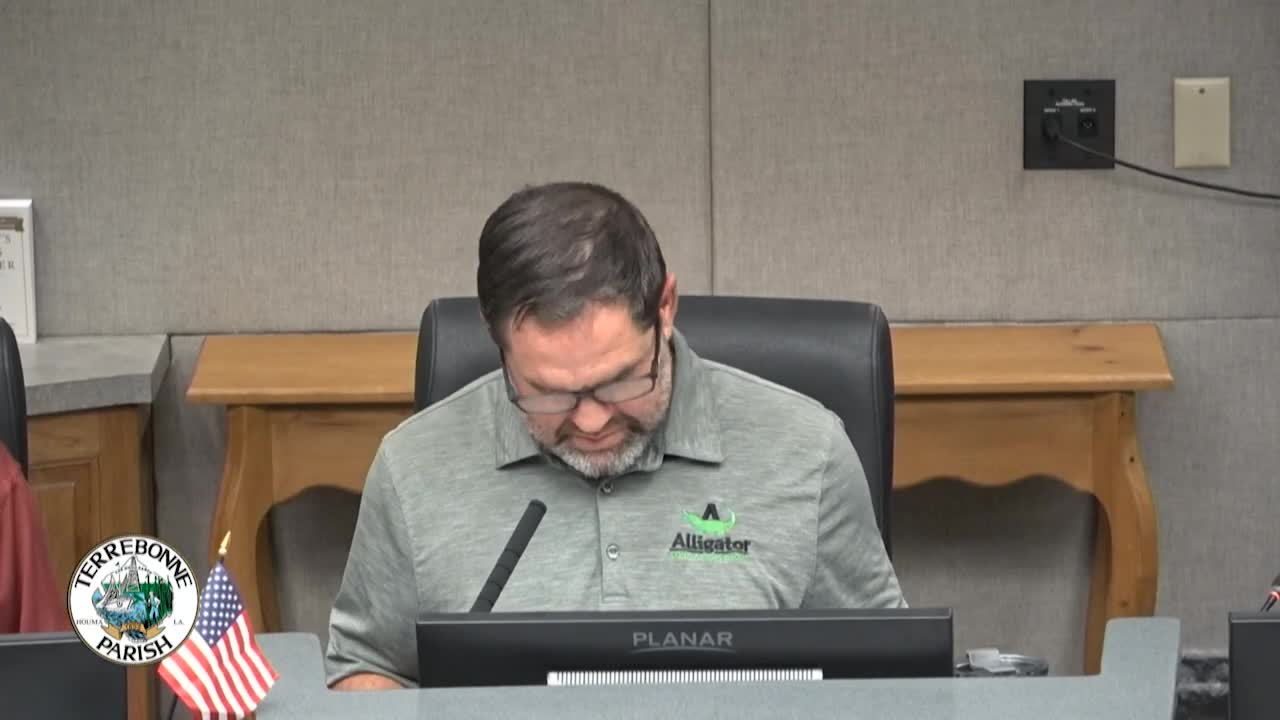Terrebonne committee narrows RV-park rules, agrees 3-acre minimum and setback options; tribal leaders call for full protections
Get AI-powered insights, summaries, and transcripts
Subscribe
Summary
Members of a Terrebonne Parish planning committee on a draft of new RV-park regulations agreed on several key changes and flagged several open questions while hearing repeated appeals from bayou residents and a tribal representative for stronger, uniform protections.
Members of a Terrebonne Parish planning committee on a draft of new RV-park regulations agreed on several key changes and flagged several open questions while hearing repeated appeals from bayou residents and a tribal representative for stronger, uniform protections. Committee members and staff discussed setbacks from “approved subdivisions,” minimum lot sizes, how to define a “major subdivision,” grandfathering and enforcement, and whether southern bayou communities should be treated differently.
The committee — led in discussion by staff members and committee members present — agreed to two setback options to seek public feedback: keep the draft 1,000-foot setback from an approved subdivision or allow a reduced 500-foot setback provided the RV park installs a vertical buffer such as a 6-foot fence or equivalent vegetation. The committee also converged on a working definition that an “approved subdivision” warranting the larger setback would be a subdivision of 10 lots or more. Committee members discussed using the Morganza levee line as a geographic cut-off for which rules would apply.
Why it matters: the draft is intended to stop poorly sited or unmanaged RV parks from locating immediately adjacent to residential lots, which residents said has produced blighted conditions in parts of the parish. Tribal and bayou community speakers said exemptions or softer rules for the parish’s South Terrebonne area would leave vulnerable communities exposed to pollution, traffic and safety risks.
Most substantive committee decisions and recommendations were procedural rather than final ordinance votes. Staff told the committee they plan to present a streamlined version of the draft at the next meeting for continued review and will forward the final recommended ordinance to the Council, which will hold the public hearing and make the ultimate decision.
On minimum size, the committee moved from the draft’s 5-acre minimum toward a 3-acre standard for at least the northern part of the parish, and discussed having a separate, abridged set of rules for the South Terrebonne area (the committee repeatedly referred to the “South Terrebonne Development Zone”). A committee member summarized the consensus: “So we’re changing 5 to 3,” and members agreed to continue work on a south-zone variant.
Staff and committee members clarified enforcement and grandfathering: an RV or RV park without an occupational or business license would not be considered grandfathered and would need to obtain the proper permit to remain. A staff member told the committee, “If an occupational use license, then they are not grandfathered in,” noting that existing unpermitted sites could be pursued through nuisance-abatement procedures or permit enforcement.
Residents and operators pressed for clarity on “road ready” standards and visual standards. Committee discussion cited an existing affidavit definition for “road ready” that requires wheels or jacking systems and related equipment to be present; speakers suggested practical checks such as license plates and insurance to ensure travel capability and to aid evacuation in storms. The committee also noted the fire-code requirement of 10 feet between campers as a minimum safety measure.
Several residents from bayou communities and a tribal representative urged the parish to apply standards uniformly and to remove an exemption for the South Terrebonne Development Zone. Jesse Beliot, identified in the record as a tribal representative, told the committee: “We want the regulations to be as strict as we possibly can,” and urged rescinding any drainage exemption that would allow RV parks in low-lying tribal communities to avoid environmental or public-safety safeguards.
The committee also agreed to remove a parenthetical limiting certain enforcement provisions to “in the city limits,” extending nuisance and disorderly-placekeeping rules to all RV parks in the parish. Staff identified related existing code provisions cited during the meeting: Terrebonne Parish Consolidated Government Code Chapter 14, Articles 8 and 9 (blighted/abandoned property and junked/abandoned/inoperative vehicles) and Chapter 19 sections discussed as disorderly-placekeeping provisions.
Next steps: staff said they will produce a condensed two-track draft (one for north Terrebonne, one abridged version for the south) for the committee’s next meeting and then transmit the ordinance to the council along with public-hearing notices. The council will take the final action and may further modify the draft. The committee also flagged the Morganza levee as a potential geographic boundary for regulation and asked staff to research the legal basis of the South Terrebonne Development Zone before finalizing any exemptions.
Quote attributions in this report come directly from the meeting record and are limited to speakers identified in the transcript.
